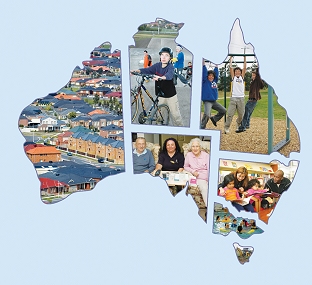With one in four Australians currently living in a metropolitan growth area, and that figure expected to rise to one in three in the next 20 years, the National Growth Areas Alliance (NGAA) was formed to ensure these people are supported with the necessary facilities and infrastructure.
The Alliance, which represents one in four Australians was initiated by the national growth council, including Whittlesea, in early 2007. Council recognised that the issues it had identified as one of the fastest growing municipalities in Melbourne were similar to those of councils in similar proximities to Brisbane, Sydney and Perth.
As such, Council and the other municipalities together formed a united front to make the case for Federal Government buy in for the future of outer suburban areas in capital cities.
Whittlesea CEO, David Turnbull, said the Alliance represents the interests of more than five million people living in more than 20 Local Government areas.
“More than $11 billion needs to be spent on community infrastructure over the next 15 years,” David Turnbull said. “However growth area councils are only expected to have access to $8.5 billion in State and Federal Government funding during that period. We urgently need to secure an additional $3.1 billion in government funding and the Alliance is getting this cause on the agenda.”
David Turnbull said that immigration is the main reason for population growth, and with most immigrants moving into growth areas, the Federal Government must make a commitment.
“The Federal Government controls immigration, and needs to provide adequate support to the places these newcomers make their home,” he said. “The Alliance has effectively raised awareness of this need and is starting to hear some positive feedback from both the Federal Government and the opposition.”
The Alliance has consolidated since its inception, and is now in the process of appointing an Executive Officer to run its operations.
“We have had really good and enthusiastic support from all our colleagues across the nation,” David Turnbull said. “More than 20 councils have come together as a nationally cohesive unit and the issues we are facing have been recognised at a Federal level by both parties.
“A three year strategic plan has been developed, establishing the Alliance as a credible organisation. This is a big achievement in itself, as many organisations come and go and are easily dismissed by the Government.”
The Alliance is currently seeking further recognition of issues in current Federal Government initiatives, such as Infrastructure Australia and the Major Cities Unit.
David Turnbull said it is also working to inform policy on urban development, and to further develop networks within the Alliance itself.
“Information sharing is a key area we hope to grow, as this has the potential to not only save time and resources avoiding reinventing the wheel, but will allow us to learn from one another on a national scale,” he said.

















